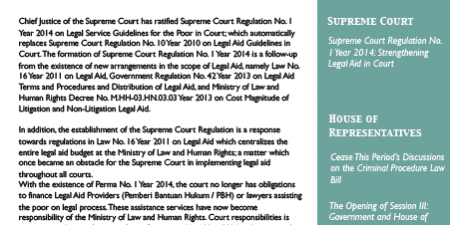Supreme Court
Supreme Court Regulation No. 1 Year 2014: Strengthening Legal Aid in Court
Chief Justice of the Supreme Court has ratified Supreme Court Regulation No. 1 Year 2014 on Legal Service Guidelines for the Poor in Court; which automatically replaces Supreme Court Regulation No. 10 Year 2010 on Legal Aid Guidelines in Court. The formation of Supreme Court Regulation No. 1 Year 2014 is a follow-up from the existence of new arrangements in the scope of Legal Aid, namely Law No. 16 Year 2011 on Legal Aid, Government Regulation No. 42 Year 2013 on Legal Aid Terms and Procedures and Distribution of Legal Aid, and Ministry of Law and Human Rights Decree No. M.HH-03.HN.03.03 Year 2013 on Cost Magnitude of Litigation and Non-Litigation Legal Aid.
In addition, the establishment of the Supreme Court Regulation is a response towards regulations in Law No. 16 Year 2011 on Legal Aid which centralizes the entire legal aid budget at the Ministry of Law and Human Rights; a matter which once became an obstacle for the Supreme Court in implementing legal aid throughout all courts.
With the existence of Perma No. 1 Year 2014, the court no longer has obligations to finance Legal Aid Providers (Pemberi Bantuan Hukum / PBH) or lawyers assisting the poor on legal process. These assistance services have now become responsibility of the Ministry of Law and Human Rights. Court responsibilities is now regulated in the Supreme Court Regulation No. 1 Year 2014 and consists of (1) fee redemption, (2) trials outside the courthouse, and (3) providing Legal Aid Posts (Pos Bantuan Hukum / Posbakum).
The establishment of Supreme Court Regulation No. 1 Year 2014 should be appreciated; since it exists to help continuing the implementation of legal aid in courts. In addition, the regulation contains an elaborative detail on the implementation technicalities, which will facilitate the supervision practice. (FN)
House of Representatives
Cease This Period’s Discussions on the Criminal Procedure Law Bill
The Criminal Procedure Code bill, during the legislation process level, should be based on two preconditions; (i) time availability, and (ii) effective and participatory discussion methods. However, seeing the discussion developments at the House of Representatives, both preconditions potentially are being unfulfilled if the particular bill is forced to be discussed during this period. The most basic argumentation is the short period of tenure remaining of the 2009-2014 House of Representatives members; around 109 working days within 9 (nine) months to complete their tasks of this period, starting from 15 January 2014 (Opening of Session III of the 2013-2014 Period) until 1 October 2014 (inauguration of the House of Representatives of the 2014-2019 period) Parallel with the last House session on the 2009-2014 period is the general elections, both legislative (9 April 2014) and presidential (9 July 2014).
Considering the general elections effect for House members; the time remaining very short, whereas the quantity of articles and discussions of the Problem Inventory List is still plenty (1.169 from the Problem Inventory List). Qualitatively, materials discussed are also quite complex, involving many stakeholders and have a broad impact on the legal structure, including human rights issue. The Criminal Procedure Law content is too crucial and fundamental on the course of the criminal justice process; if it were going to be imposed in such conditions, surely it will give a negative impact on the bill revision.
Therefore, the Government and House of Representatives (in this case, the Working Committee of the Bill on Criminal Procedure) should cease discussions of the Bill on Criminal Procedure until the 2009-2014 House of Representatives period ends. Furthermore, the Government and House of Representatives are encouraged to incorporate the Bill into the National Legislation Program, be it for the 5 (five) year or 1 (one) year priority. Effective discussion methods and guaranteeing optimal society involvement and participation is highly expected in House of Representatives discussions on the Bill on Criminal Procedure for the upcoming period. (MSG)
House of Representatives
The Opening of Session III: Government and House of Representatives Continue Discussions on New Autonomous Regions Establishments
On 15 January 2014, the Indonesian House of Representatives held a Plenary Session as the opening of Session III which has been underway since 15 January 2014 until 6 March 2014. There are only 36 working days during Session III where the House of Representatives will continue to carry out their 3 (three) functions; legislation, budgeting, and supervision.
During this period, the legislation function implementation will be focused on completing 66 bills which already set as 2014 priority Bills. It consists of 34 bills which have entered first stage of discussions, while the rest are at still on the harmonization stage at the House of Representatives Legislative Council and also at the preparation stage at the House of Representatives, Government and Regional House of Representatives. In addition, there are several bills in the open cumulative nature. Regarding the Bill on the Establishment of New Autonomous Regions, the Government along with the House of Representatives will continue the discussion process by prioritizing regions which already qualified for development.
In their budgeting function, the House of Representatives will continue to monitor developments of State Budget implementations for the 2014 fiscal year. As for House’s supervisionary function, the entire Supervisory Team will continue carrying out their duties. One of these teams is the Land Settlement and Agrarian Conflict Supervisory Team who focuses on a very complex defense issues involving many parties; village-owned enterprises, state-owned enterprises, the Indonesian National Armed Forces, the Indonesian National Police, and customary communities among others. (RR)

